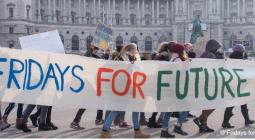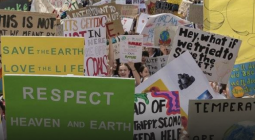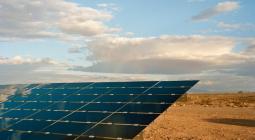YEET CAPITALISM - Our speech from devon youth parliament.
On the 29th, two of our strikers spoke at devon youth parliament’s climate forum about the green new deal and participatory democracy; this is their speech:
We've seen the reports, we've read the stories, we know why we're here: the climate crisis is rapidly approaching, and people in the global south live at the sharp end of this crisis. Drought, fire, famine, flooding. In 2017, Hurricane Maria hit, and the collapse of infrastructure burdened by years of cuts resulted in the loss of around 5,000 lives in Puerto Rico. Cyclone Idai swept through Mozambique, Malawi, and Zimbabwe this March, the UN called it the worst disaster to strike the Southern Hemisphere in history. This summer, we saw the Amazon burning in the scars of agribusiness, whilst the indigenous people defending it were threatened with death
This is a crisis. Our crisis, inherited alongside a fractured nation, rising inequality, ecological degradation, and GCSEs.
Our government claims we are a ‘world leader’ on climate, and our council stand on this platform, playing the same tricks as those in number 10.
We are learning, right here, right now, about politics. This is school without the classroom.
But what can we do? Cut down on flying? 70% of flights are taken by only 15% of people, so even if no one in this room flew again, we are powerless against the private jets and the New York shopping weekends of the ultra rich. What about driving electric cars? Their batteries rely on the mining of precious metals in developing nations, where working conditions are deadly and democracy is being destabilised to improve access for global corporations to exploit their resources. Take Bolivia: when Evo Morales was ousted mere weeks ago, companies such as Tesla - who rely on precious metals - even saw stock prices rise upon the news of the coup.
Fortunately, there is a way to address the climate crisis while also striving for global social justice, especially for those in the global south and deprived north. The climate movement calls it the Green New Deal.
So, what exactly is the green new deal? In essence, it's a proposal of five guiding principles to totally decarbonise and restructure the UK economy by 2030, while delivering secure jobs and a habitable future. The Green New Deal will:
One, decarbonise the UK economy by 2030 in a way that enhances the lives of ordinary people, workers and communities and works to eliminate social and economic inequality.
Two, create green, well-paid, secure, unionised jobs for those currently working in high carbon industries
Three, transform societal structures to place human well being at the centre, to enable democratic participation, accountability and common ownership
Four, restore vital habitats and wild areas, promoting clean air and water for all
Five, promote global justice by supporting all peoples and countries to decarbonise quickly and fairly, in line with timeframes set out by science, including through transfers of resources, finance and technology from historic emitters in the Global North to the Global South.
Here at fffexeter, we've been developing our own green new deal, aiming to find realistic policy proposals, based off current implementations in other cities, counties, and countries, which should be implemented within Devon. Now that we've completed a first draft, we’re beginning to reach out to other local groups and communities for feedback on how to develop further, in order to find the best possible version. This in itself falls under the GND’s third principle: promoting democratic participation and finding solutions which work for everyone. Under current systems, it seems improbable that this could be achieved, which is why the development of participatory democracy and wider enfranchisement and empowerment is key for the success of decarbonisation and social justice.
We'll come back to this later, but before we do, we'd like to ask: what can you do in your school? You can push for the development of secure bike racks, accompanied by bike lanes, and even decreasing speed limits to make roads safer for those not in cars. In 2018, Devon County Council announced that they'd increase funding for bike infrastructure to 15% of the transport budget; and yet it still sits at 7%, or £2m, compared to the £93m they spent on a single road project.
You could also help within your area to find public spaces which could be rewilded. Access to nature is strongly linked with improved educational progress and mental health, and so immersion in forest schools - or even just increasing natural diversity within school grounds - can be seen to help.
Now, this third idea is perhaps more complicated: currently, most schools have food and meals provided by external companies. If schools were to take over their kitchens then they could control prices so that they're no longer run for profit, while also having the freedom to look more closely at where the ingredients come from. In Lancashire, the contracts for ingredients were divided and awarded locally, meaning that almost all food served in schools came from nearby farms. Not only did this reduce food miles, and provide a £2m boost to the local economy, but it also allows for connections between farms and students, which can be utilised to educate students about the process of organic or sustainable agriculture.
But this now raises the question, how would we actually go about achieving some of these greater changes, and how is the current system preventing such reform?
Our political system is stagnant to change. Our leaders are elected in such short terms, they can develop no long term vision for change, thus preventing them from really planning how we will react to the climate crisis. Political parties fear social unrest over environmental regulation - such as the Jilet Jaune protests in France rioting against fuel taxes, which negatively affected the poor the most. In government, climate change is also almost never viewed as a “political” issue and, being relegated to an “environmental” concern, it is never addressed with due importance. Governance surrounding climate change has been biased towards maintaining the current state of the economy, causing business interests to constantly be placed above what workers, communities, and those living at the sharp end of the climate crisis are demanding.
Put simply, our government believes that we can make the current system ‘green’, even though experts are saying this is impossible- literally impossible.
We are learning, right here, right now, about politics. This is school without the classroom.
But what is the solution, if the current government or the economy won’t save us, then where does the future lie?
We are learning, right here, right now, about the future. This is school without the classroom.
We need to build an economy which can prove successful for those of us without large corporations or oil money, focusing instead on the local businesses which hold communities together.
But, how do we begin reforming local decision making into the hands of the people?
Well, let's take a look at our justice system: people frequently argue that the general public can't be trusted to make important decisions, and yet juries of our peers regularly aid in vital decisions in others' lives, arguably as the foundation of the judiciary. And so why should local governing be any different? Yes, we can stick with the elected councillors to write and research new policy, but what if - every month or so - a new group of citizens were brought in to read over the proposals (especially those which are in any way climate related) to ensure that the council remains accountable and operates within the public's interest. These people would need only to give up an evening or so a week for around a month, and could be compensated for their time, and yet the work they could do would become so vital in the relationship between citizens and those in power, effectively allowing each of us to play an active role within our own societies.
From here, we can start exploring how people can be involved in the democratic process beyond mere consultation. We could start by creating Citizens Assemblies, as Devon County Council has agreed to do. However, consulting citizens only once, to produce a few non-binding proposals is not a full flourishing of democracy. We need to create assemblies, juries, and working groups which are an integrated part of governance, with real power to make decisions. Participatory budgeting, for example, is a tool used to allow communities to decide themselves how taxpayers’ money is spent, and could be integral to a Green New Deal as it is a plan fuelled by public money - that is, the money the government has. If these bodies are given access to tax money collected by local banks, these new structures could restore local councils – which, from our experience as youth strikers, are painfully stuck in the past.
Participatory budgeting, in turn, incites people to become more engaged in local politics, especially if they receive a voice in their ordinary lives through a democratisation of ownership through worker owned coops, community food production, and citizen journalism. In beginning to think about how we can redistribute decision-making, the possibilities for levelling society become endless.
We are learning, right here, right now, about the future. We are learning about how to act collectively. Connect dots, question authority, and aim for change, change, and change again. This is an emergency. This is school without the classroom. And we are here to teach you a lesson.
The polluter must pay, the rivers may stay, and the lying, hiding, and running must stop. We need the kids to bind our councils to law, because ignoring is all they’ve done before.
30 November 2019
FRIDAYS FOR FUTURE




